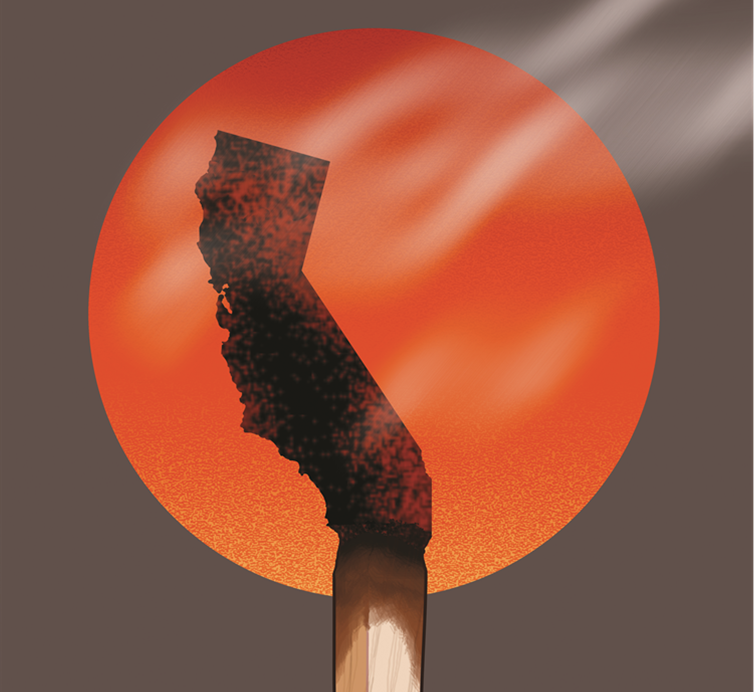Among the many disasters that marked 2020 were the apocalyptic wildfires that raged in the American west, turning the skies into eerie dystopian shades of orange and leaving over 4 million acres of land burned in the state of California alone. According to CalFire’s list, six of the 20 largest recorded wildfires in California since 1932 raged during the summer of 2020. Unfortunately, California is poised for another catastrophic summer. Consistently devastated by extreme heat, drought, and wildfires in recent years, the state has been enduring the ravages of climate change. Yet, unless California is being actively destroyed by massive wildfires, its climate emergency sees little airtime from major news networks.
Disaster arrives sooner than expected
Despite being known for beaches, surfers, and showbiz, California actually has the highest agricultural output of any state in the U.S. Leading in the production of both crops and livestock, the mostly rural state produces approximately two-thirds of the country’s fruits and nuts each year. To put the volume of that output into perspective, ten percent of California’s water goes to almond farming alone. Theoretically, a drought in a state with such a heavy agricultural burden could be one of the worst things for America’s economy, leaving thousands of agricultural workers unemployed and driving up the price of food around the country – and that scenario is close to becoming reality.
According to the U.S. Drought Monitor, as of June 15, 2021, nearly every county in the state of California is categorized as experiencing the second highest level of water shortage: “Extreme Drought.” Many counties – nearly one-third of the state – are also experiencing “Exceptional Drought,” the worst possible level. These degrees are extreme, both in the general sense and compared to recent years.
Though summer has only just begun, almost all of California’s major reservoirs are below the historical average; some are lower than their average from three years into the last major drought. According to California’s Department of Water Resources, California has experienced a record low amount of precipitation in 2021. A miniscule snowpack in the Sierra Nevada Mountains – the summer melt provides a critical source of water during California’s dry summer months – has left little runoff to replenish rivers and nourish dry vegetation.
California’s drought has not arrived unaccompanied. Major heatwaves are already sweeping across the southwest with temperatures reaching into the triple digits. Although Californians are no strangers to extreme heat, temperatures are soaring far earlier in the year than expected, breaking records for the month of June. Communities are experiencing heat-related power outages, and rolling blackouts are anticipated in several cities over the summer. California’s central valley will kick off the month of July with temperatures persisting above 100 degrees Fahrenheit, elevating the threat of wildfires and creating dangerous conditions for outdoor workers and the state’s homeless population. A wet season that was not very wet and an unusual heatwave have dried out California’s unkempt wild vegetation, creating significant fire potential.
Disappointing news coverage by mainstream media
Historically, news media loves disasters. They make for gripping content and reel in lots of viewers. Every hurricane that strikes the coastal U.S. receives ample coverage. Conversely, wildfires and other climate disasters in California have struggled to get attention. In a 2018 study conducted by Recode, east coast hurricanes received nearly three times as much news coverage as west coast wildfires.
When California (and much of the west) burned last summer, it was bit harder to overlook; the atmosphere turned an insidious orange and smoke from the west traveled across the country and blotted out the sun all the way on the east coast. While coverage significantly increased from previous years, it still didn’t seem like enough. According to an analysis from Media Matters, the corporate broadcast outlets ABC, CBS, and NBC only aired a combined 114 segments on wildfires during the entire month of August, rounding out to approximately one broadcast segment from each outlet per day during the peak of the wildfire crisis.
This year, a search on FOX or MSNBC’s news page will bring up only a handful of articles pertaining to California’s droughts or heatwaves. Climate reporting should be at the forefront of all news, but in a separate analysis from Media Matters, most news coverage from corporate outlets – specifically ABC, CBS, and NBC – made almost no mention of climate in their coverage of last year’s fires. Only seven of the 46 wildfire segments aired over the course of four days mentioned climate change. Four of those seven mentions were from one reporter: Meteorologist and Climate Specialist Jeff Berardelli.
California’s ailments – even the not-so-cinematic droughts and heatwaves – are indicative of a climate disaster. California’s looming calamity cannot continue to be overlooked by the mainstream media. Critics say that corporate ownership of media is a key reason for this situation. News outlets should remember that one of the major functions of journalism is to uphold the public interest. Mainstream media is duty-bound to inform the public why California faces a climate emergency and why the authorities need to act before life in The Golden State becomes unendurable.
Illustration by Nemo Cartoons.

